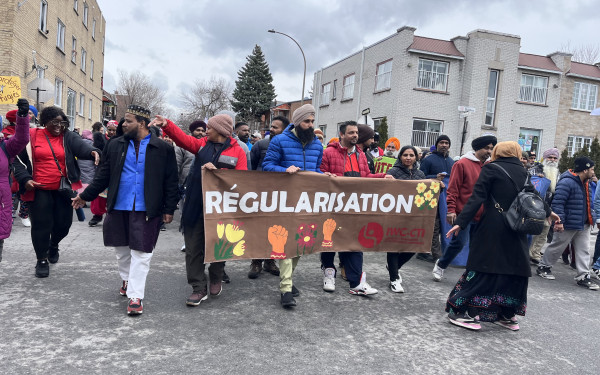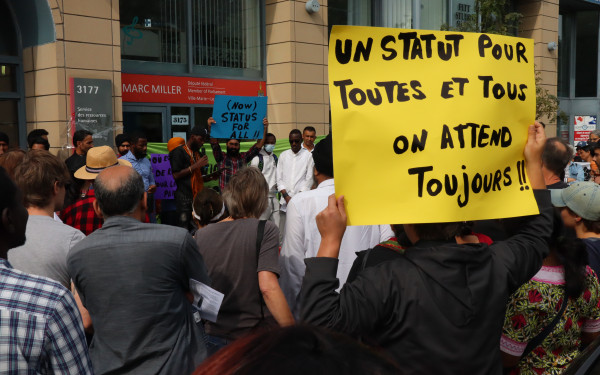Montrealers protest decade-long waits for migrant status
Various immigrant rights organizations request the implementation of a promised inclusive regularization program
On Feb. 21, the Speak out: Status for All immigrant rights protest was held outside Minister of Immigration Marc Miller’s Montreal office, as part of an ongoing week of action led by various organizations.
A crowd of roughly 50 people showed up, holding signs that read “regularization for all” and chanting ‘un statut pour toutes et tous,’ or ‘a status for all,’ throughout the protest.
According to event organizer Mostafa Hanaway, the protest was “part of a larger call to action” for the federal government to implement an inclusive immigrant regularization program.
Hanaway is part of the Immigrant Workers Centre, which worked alongside the Migrant Rights Network and Solidarity Across Borders to make this protest happen. The regularization program, he said, was promised over two years ago by Prime Minister Justin Trudeau but has yet to be adopted.
This program, which Trudeau addressed in his mandate letter to the Minister of Immigration in December 2021, promised to regularize all immigrants without status. Hanaway said that he and other members of the various immigrant rights organizations involved are looking to get a concrete definition of the program’s inclusivity — they are looking for a program that follows through with its promise to pertain to everyone, without exception.
“Not a program that’s going to be limited, not a program that’s going to be sectoral,” Hanaway stated. “That everyone will be included in the program.”
He further explained that the week of action taking place from Feb.19 to 23 correlated with the federal cabinet ministers being present in their ridings in Montreal. Throughout the week, protesters have been demanding meetings with each of the various federal ministers present in the city.
“People have been waiting under this promise and now we’re seeing deportations increase, we’re seeing a rise of detentions,” he said. “It’s really becoming much more precarious, and people are in a much more dangerous situation.”
One protester attested to this statement through her own experience. The protester, who requested anonymity for safety reasons, claimed that she and her daughter had experienced poor treatment from the federal government, despite having followed all the necessary steps to achieve legal status.
“We fell out of status over a violent situation we went through, and we hired a lawyer, we followed the process, we followed the regulations that the government is setting,” the protester said. Despite this, after four years of struggling, her daughter’s application has not yet been approved.
“My daughter is married to a Canadian — they just had their first baby just two months ago — and they want to deport her,” she said. “This is an inhumane and unacceptable behaviour from the government of Canada, given that it’s someone who is actually fulfilling all the [necessary] requirements.”
Another protester, Mariana Guadalupe Sanchez, expressed a similar situation.
“[This protest] affects me a lot because I’ve been here 15 years and I’m still waiting on the government to give me my papers,” said Sanchez. She said she’s hoping for an actual response from the government that will lead to action that would help her and others in her situation.
Immigrant rights organizations in Montreal are looking to keep consistent pressure until the federal government finally implements the regularization program, according to Hanaway.
“We’re also going to be following up in the coming months as a set of actions between the beginning of spring until the summer — until the parliamentary session ends,” he said.
At the height of the COVID-19 pandemic, the Canadian workforce was led and supported by mostly immigrant workers, stated the anonymous protester.
“I hope [the government] understands that this is not only because we support the economy but also because we are human beings and we are here, entitled to be recognized as people with rights,” she said.

_900_675_90.jpeg)





